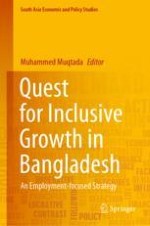2020 | OriginalPaper | Buchkapitel
3. Inclusive Growth in Bangladesh: Evidence and Issues
verfasst von : Towfiqul Islam Khan, Mostafa Amir Sabbih, Muntaseer Kamal
Erschienen in: Quest for Inclusive Growth in Bangladesh
Verlag: Springer Singapore
Aktivieren Sie unsere intelligente Suche, um passende Fachinhalte oder Patente zu finden.
Wählen Sie Textabschnitte aus um mit Künstlicher Intelligenz passenden Patente zu finden. powered by
Markieren Sie Textabschnitte, um KI-gestützt weitere passende Inhalte zu finden. powered by
